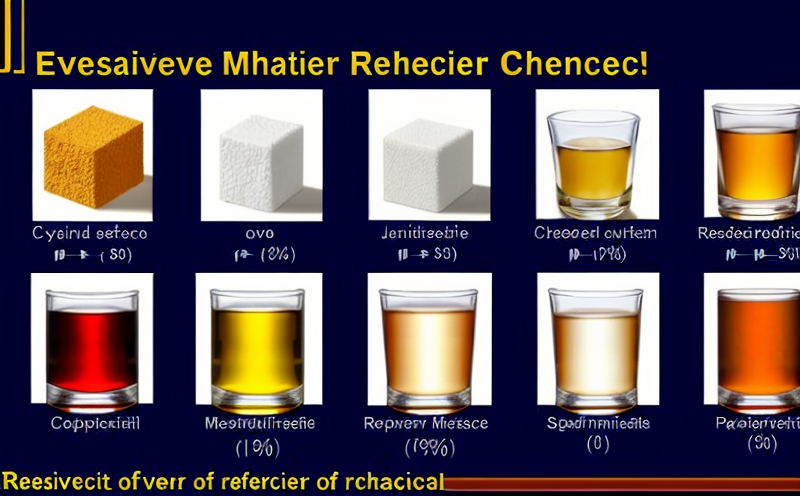Evaluating how different materials react when exposed to specific chemicals
Evaluating How Different Materials React to Chemicals Unlocking Business Success with Eurolabs Expertise
In the world of manufacturing and product development, ensuring that materials can withstand exposure to chemicals is a critical consideration for businesses across various industries. Whether youre designing new products, reformulating existing ones, or simply seeking to understand how your materials will react in different environments, evaluating their performance under chemical stress is an essential step towards achieving success.
At Eurolab, we provide a comprehensive laboratory service that enables our clients to assess the behavior of diverse materials when exposed to specific chemicals. Our expert team utilizes cutting-edge equipment and techniques to simulate real-world conditions, providing valuable insights into material durability, stability, and performance. In this article, well delve into the importance of evaluating how different materials react to chemicals, highlighting the advantages of using our services, and answering frequently asked questions.
The Importance of Evaluating Material-Chemical Interactions
Material-chemical interactions can have far-reaching consequences for businesses, including
Product failure When materials are not resistant enough to chemical exposure, products may fail prematurely, resulting in costly recalls, reputation damage, and financial losses.
Compliance issues Failing to meet regulatory requirements can lead to fines, penalties, or even product banishment from the market.
Liability risks Companies that dont assess material-chemical interactions may be held liable for injuries or damages caused by their products.
By evaluating how different materials react to chemicals, businesses can
Develop safer and more reliable products
Reduce costs associated with recalls and compliance issues
Enhance brand reputation through product excellence
Advantages of Using Eurolabs Evaluation Services
Our laboratory service offers numerous benefits for businesses, including
Advantages of Material-Chemical Evaluations
Accurate predictions Our expert team simulates real-world conditions to accurately predict how materials will react in various chemical environments.
Comprehensive testing We offer a wide range of tests to evaluate material performance under various chemical stresses, ensuring that your products meet regulatory requirements and industry standards.
Customized solutions Our services cater to specific business needs, providing tailored evaluations for various industries, including aerospace, automotive, textiles, and more.
Benefits of Partnering with Eurolab
Streamlined product development By understanding material-chemical interactions early on, you can optimize your products and reduce time-to-market.
Cost savings Evaluating material performance upfront can help prevent costly recalls, redesigns, or other product revisions.
Increased competitiveness With reliable and high-performing materials, youll be better equipped to meet market demands and stay ahead of the competition.
Enhanced Collaboration with Eurolab
Expert consultation Our team provides expert guidance on material selection, formulation, and testing, ensuring that your products meet industry standards.
Rapid turnaround times We offer expedited testing services to accommodate urgent business needs or tight deadlines.
Data-driven decision making By providing detailed reports and recommendations based on our evaluations, we empower you to make informed decisions about material choices and product development.
Frequently Asked Questions
What types of materials can be evaluated?
Our laboratory service caters to a wide range of materials, including plastics, metals, textiles, coatings, and more.
How long does the evaluation process take?
Turnaround times vary depending on testing requirements; however, our expert team works efficiently to provide results within a timeframe that suits your business needs.
What chemicals can be tested against?
We simulate exposure to various chemical substances, including solvents, acids, bases, and oxidizing agents, among others.
Can I outsource the entire testing process to Eurolab?
Yes! We offer comprehensive evaluation services that include sample preparation, testing, data analysis, and report generation.
Conclusion
Evaluating how different materials react to chemicals is a critical step in ensuring product safety, reliability, and regulatory compliance. By partnering with Eurolab, youll gain access to expert knowledge, cutting-edge equipment, and streamlined processes designed to meet your business needs. Whether youre developing new products or refining existing ones, our laboratory service will help you navigate the complexities of material-chemical interactions and unlock success in your industry.
To learn more about how Eurolabs evaluation services can benefit your business, please explore our website for detailed information on our capabilities, case studies, and testimonials.
-
Testing chemical resistance of materials in various industrial environments
-
Assessing the long-term compatibility of materials with various chemical substances
-
Determining how chemicals affect the physical properties of metals, plastics, and ceramics
-
Simulating material failure under different chemical exposures in manufacturing processes
-
Evaluating the impact of chemical exposure on material integrity in harsh environments
-
Ensuring that chemical formulations do not compromise the strength or performance of materials
-
Assessing compatibility with materials used in packaging, coatings, and containers
-
Testing the impact of aggressive chemicals on seals, gaskets, and other critical components
-
Evaluating the interaction between different chemicals and materials used in consumer products
-
Testing the effect of chemical exposure on elastomers and rubber materials
-
Assessing the compatibility of composite materials with aggressive chemicals used in industrial applications
-
Ensuring that chemicals do not cause degradation or corrosion of equipment, pipelines, or tanks
-
Simulating different chemical exposure scenarios to determine material suitability and durability
-
Testing materials for compatibility with chemicals at different temperatures, pressures, and conditions
-
Evaluating chemical interactions between two or more substances and their effect on material properties
-
Testing the compatibility of materials used in the automotive, aerospace, and medical industries with chemicals
-
Determining the best material choices for applications involving aggressive chemical environments
-
Testing the effects of chemical exposure on surface finishes, including coatings and plating
-
Ensuring the safe use of chemicals in consumer goods by testing material compatibility for health and safety
-
Evaluating the stability of materials over time when exposed to chemicals in manufacturing and storage
-
Determining the performance of coatings and films when exposed to various chemicals used in industrial processes




